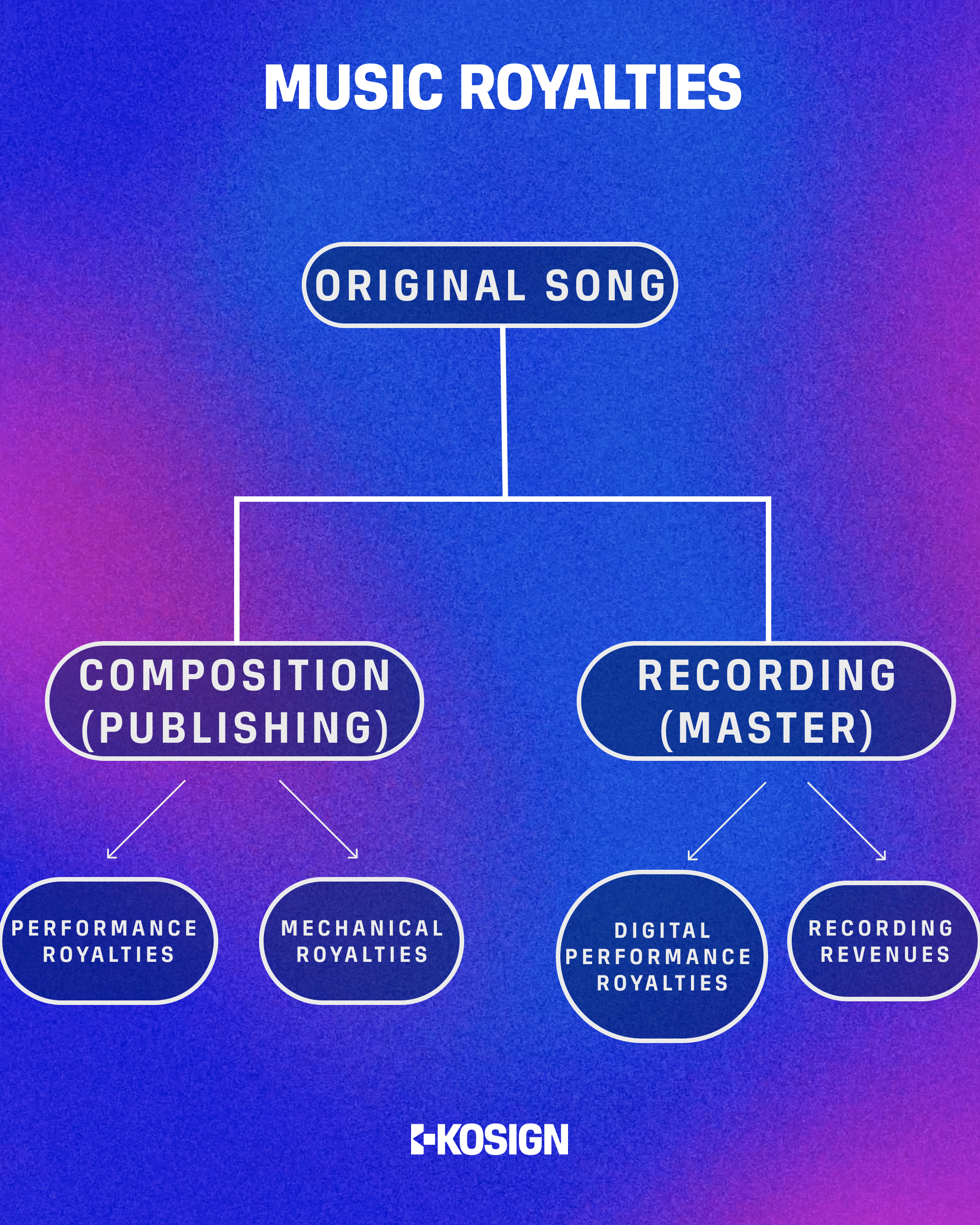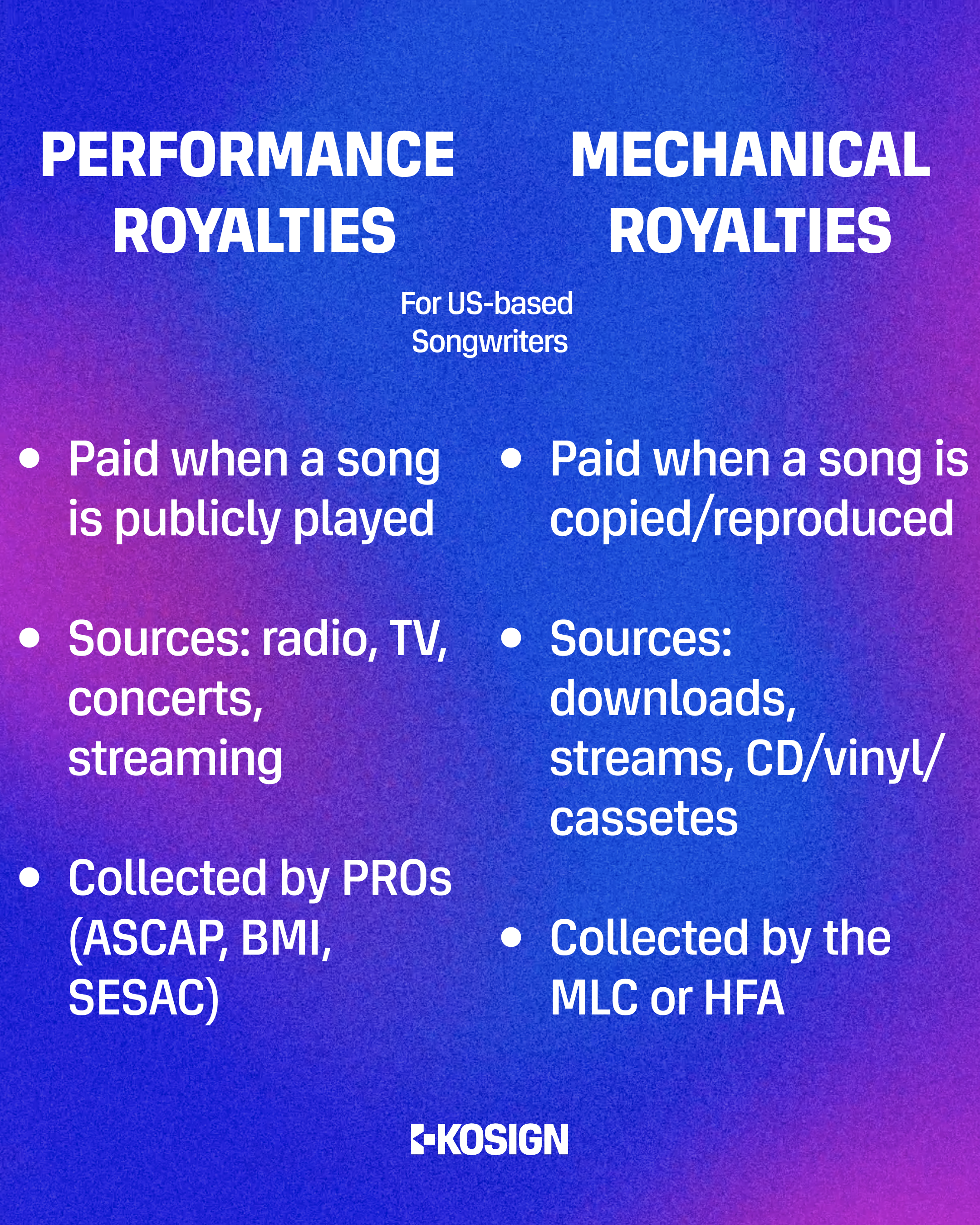Summary
- Mechanical royalties are essential payments to songwriters and publishers whenever a musical composition is reproduced (streamed, downloaded, or physically sold), and are often unclaimed if songs are not properly registered or tracked.
- KOSIGN, powered by Kobalt, helps songwriters maximize mechanical royalty collections by handling global song registration, licensing, tracking royalties in real time, and providing transparent, regular payments.
- Recent changes (like the Music Modernization Act and the Mechanical Licensing Collective) have streamlined digital royalty collection in the U.S., but complexities remain making dedicated publishing admin services like KOSIGN vital for ensuring songwriters receive all royalties owed.
In the digital age of music, understanding mechanical royalties is more important than ever for songwriters. Whether you’re a self-administered songwriter, part of a record label, or simply trying to make sense of how royalties are paid, grasping how mechanical royalties work is key to protecting your income. In this article, we’ll break down what mechanical royalties are, how they're collected, how much money is at stake, and how KOSIGN, powered by Kobalt, can help you make the most of your music.
What Are Mechanical Royalties?
Mechanical royalties are payments made to rights holders, usually songwriters and music publishers, when a musical composition is reproduced. That means every time your song is downloaded, streamed on digital music providers, pressed onto vinyl records, or sold as a physical product, you're owed a royalty. These royalties originated during the era of piano rolls and player pianos and remain one of the most important income streams for songwriters in today’s music industry.
How Mechanical Royalties Work
Every time your musical work is duplicated or distributed, you’re owed mechanical royalty payments. This applies across physical formats (like CDs and vinyl), digital downloads, and interactive streaming through platforms like Apple Music and Spotify.
If you’re a copyright owner, ensuring you collect mechanical royalties from these uses is crucial. However, many unclaimed royalties fall into the so-called "black box" when there’s no registered rights holder to collect them. That’s lost money, unless you have proper admin support.
Who Pays Mechanical Royalties?
Mechanical royalties are paid by the party that reproduces your musical composition. For example:
- A record company pays mechanical royalties when it manufactures and sells physical albums.
- Digital music providers like Apple Music, Amazon Music, or Tidal pay when users stream or download music.
- Foreign music publishers and collection societies pay for international uses - if your works are properly registered.
Mechanical Royalties vs. Performance Royalties
Many songwriters confuse mechanical royalties with performance royalties. Here’s the difference:
- Mechanical royalties are owed for reproduction.
- Performance royalties are owed when your song is performed publicly, on radio, in a TV show, or in a venue.
Both are critical, and many platforms (like Spotify) generate both at once. That’s why many songwriters rely on admin partners to collect from every possible source.
The Music Modernization Act and the Mechanical Licensing Collective
Thanks to the Music Modernization Act, the U.S. launched the Mechanical Licensing Collective (MLC) to simplify how mechanical royalties are collected for digital uses. The MLC issues a blanket license to digital music providers, allowing them to stream music while ensuring mechanical royalties are paid directly to registered copyright owners.
KOSIGN helps you make sure your songs are correctly registered with the MLC and with societies around the world so you never miss a payment.
What Is a Mechanical License?
A mechanical license grants permission to reproduce a musical composition. Whether it's a digital download, a cover, or a physical sale, someone needs this license to legally use your song. When you’re part of a publishing deal, the publisher manages this for you.
KOSIGN supports self-administered songwriters and individual songwriters by handling mechanical licenses and licensing your works globally.
How Are Mechanical Royalties Calculated?
In the U.S., mechanical royalty rates for physical formats and downloads are typically based on a penny rate currently 9.1 cents per single song per sale. For streaming royalties, it’s more complex:
- The fair market value of the stream
- The percentage paid by the streaming services to rights holders
- Your share of the total streams
This makes accurate tracking essential. KOSIGN uses Kobalt’s proprietary tech to monitor usage and ensure fair, fast, and direct royalty payments.
How the Harry Fox Agency Fits In
The Harry Fox Agency (HFA) historically handled most mechanical licensing in the U.S. for record labels and publishers. While the Mechanical Licensing Collective now manages much of that work for digital reproduction, the HFA still plays a role, especially with physical sales and certain types of direct licensing.
KOSIGN helps make sure you’re covered no matter where the licensing is happening.
Why Mechanical Royalties Are Often Uncollected
Many songwriters are unaware that mechanical royalties even exist. Even more don’t realize they need to register their songs across different territories. This leads to:
- Unclaimed royalties in global markets
- Delayed mechanical royalty payments
- Money stuck in black box accounts
KOSIGN changes this. We track your songs in real-time across global platforms, ensuring mechanical royalties get to you.
Mechanical Royalties in the Digital Age
The rise of music streaming and digital downloads means more mechanical royalties than ever, but also more complexity. From Apple Music to Bandcamp, the burden of reporting and tracking now falls on you unless you have a publishing admin partner.
KOSIGN ensures that every stream, sale, and sync generates the royalties you’re owed, and that they’re collected efficiently.
How KOSIGN Helps Songwriters Collect Mechanical Royalties
KOSIGN is a publishing admin platform created by Kobalt, trusted by top-tier talent and designed for songwriters making over $5K annually in publishing income. With KOSIGN, you:
- Collect mechanical royalties from over 200 countries
- Track revenue from every sound recording, master recording, and composition copyright
- Retain ownership no hidden clauses
- Receive transparent reporting by song, territory, and platform
- Get paid quarterly through Stripe, quickly and securely
Who Needs to Collect Mechanical Royalties?
If you’re a:
- Songwriter
- Publisher
- Record label
- Copyright owner
- Artist releasing physical product
- Indie artist on streaming services
You’re owed mechanical royalties. KOSIGN ensures you’re not just registered, but getting paid.
Final Thoughts: Don’t Leave Money on the Table
Mechanical royalties are a critical income stream for anyone involved in music creation. Whether your music is downloaded, streamed, or pressed onto vinyl, you’re owed mechanical royalty payments.
KOSIGN exists to make sure those mechanical royalties are paid accurately, globally, and on time. From ensuring your works are registered with the copyright office, to tracking usage across TV shows, YouTube, and streaming services, we make sure your songs work for you.
Apply today at www.kosignmusic.com and start collecting what you’re owed.
Want to learn more about music publishing? Be sure to follow us on LinkedIn for videos and resources to level up your music publishing knowledge.

